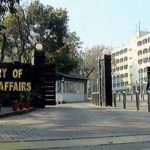ISLAMABAD, Sep 25 (APP): Amid war talks by India after Uri attack, Pakistan’s High Commissioner in New Delhi Abdul Basit on Sunday ruled out the notion of both countries going to war.
He said “I strongly believe Pakistan and India do not gain anything from creating hype. War is not a solution, war creates more problems.”
“We can perhaps afford not to talk to each other for some time, but addressing our many bilateral, regional and global challenges can only happen through dialogue”, the high commissioner said in an interview with Telegraph India, an Indian English daily.
He said : “I am not ready to give up on that. We should not allow war hysteria to dominate our narrative.”
He said investigation was yet going on to determine what really happened in Uri so it was important not to draw premature conclusions. “It is not helpful to jump the gun,” he remarked.
He said Pakistan had extended all out cooperation after Pathankot incident and things were moving in the right direction. Both the countries could prevent the situation from worsening, if the spirit was maintained.
“I am a diplomat and I would like diplomacy to win. I, for once, would not like to believe that bilateral diplomacy has exhausted itself,” Abdul Basit remarked recalling Prime Minister Nawaz Sharif’s remarks at UN General Assembly that Pakistan desired to have a normal, co-operative relationship with India and resolve all problems peacefully.
He said Pakistan believed that issues should be resolved only through peaceful means and there is no other way.
The high commissioner viewed that Pakistan and India were on right track till July 8 when Kashmiri freedom fighter Burhan Wani was killed by security forces in Indian Occupied Kashmir.
To a question, he categorically made it clear that Pakistan had nothing to do with the Uri attack as it was committed to not allowing its territory to be used for violence anywhere in the world.
He said problems in Indo-Pak ties did not begin with the Mumbai attack, Pathankot or Uri attacks, rather they fought three wars, besides a military conflict over Kargil.
But both countries agreed that there was a long-pending issue of Jammu and Kashmir, needing resolution. “Be it UN Security Council Resolutions or even the Simla Accord, both countries agreed on resolving this problem through dialogue”, he added.
“It is important to understand what keeps bedeviling our relationship and what keeps bringing mistrust between us.
We feel it is imperative not to shy away from addressing the Jammu and Kashmir dispute,” the high commissioner said.
He said terrorism was an important challenge for both countries that could be met more effectively if they co-operate rather than blame each other all the time.
He said diplomacy could not be conducted through verbosity. Diplomacy has to be conducted on the basis of sovereign equality and mutual respect and understanding, he added.
Responding to a question, Abdul Basit said Kashmir issue could not be brushed under the carpet as what was happening in Occupied Kashmir, in Srinagar and surrounding areas, manifested the seriousness of the problem.
“Pakistan is not asking for something that is unrealistic or unfair. Kashmir is the central problem between us. I am not saying other issues are not important, they are, but Kashmir we have to settle,” he remarked.
Mentioning various confidence-building measures between Pakistan and India, he said both countries should avoid entering a cul-de-sac.
“Once we get into a blind alley, it will be very tough getting out,” the envoy remarked.
Asked to comment on unconfirmed reports of Indian revenge of Uri attack by a covert cross-border strike on some camps, the high commissioner said he didn’t believe any such thing happened.
“Pakistan is capable of defending itself, but I wouldn’t like to think things will escalate to that impasse.”
The High Commissioner Basit said “the idea of having diplomatic engagement is to not allow those forces which want the two of us to resolve problems and usher in a new era of co-operation.”
“We have to transcend this process of one step forward, two steps back. But it requires two to tango,” he said.
High Commissioner Abdul Basit said talks could not be a one-sided affair. “One should not be totally dismissive about the potential of our diplomatic engagement”, he added.
To a question as Indian government had alleged Pakistan of involvement in terrorist activities, Basit said inter-state relations were not about verbosity.
“We can also come up with such catchy phrases, but that doesn’t serve any purpose. This unnecessary hype will take us nowhere. We need to be positive”, he remarked.
He said there was a need to get out of pointing fingers. “If there is a problem, we can always discuss it, but discussing everything through the media is not healthy diplomacy,” he added.
About the threats hurled by Hafiz Saeed and Salahuddin to India, the high commissioner replied that such voices were found in India too. “Our policy is not driven by their fiery speeches, and neither is yours, I would like to believe,” he commented.
When asked what was so special about Burhan Wani, the high commissioner said, “It is not about Burhan Wani. It is about Kashmir. This goes back to 1947. To fix everything now on Burhan Wani is of no help. It is about Kashmir and Kashmiris, the way they came out for his funeral and what has been happening thereafter. It is all spontaneous.”
He said India could always interpret what’s happening in terms of terrorism, Pakistan can always keep affirming its own position. “You have your discourse, we have our narrative on Kashmir. But just that will take us nowhere, we have to talk about it.”
He made it clear to India that Kashmir was not about a territory. It was not a territorial dispute alone. There are, after all, 12 million people involved. Pakistan has no desire to be irredentist in our approach.
He said the people of Jammu and Kashmir should be given a fair chance to determine their future. If the people of Jammu and Kashmir believe they are happier with India and their future is there, so be it, Pakistan would not have any problem, he commented.
About the mechanism of plebiscite in IOK, he said it should be kept in view that no solution to Jammu and Kashmir could be sustained if it was not acceptable to the people.
To another query about the alleged human rights suppression in Balochistan, Abdul Basit said Balochistan was not represented by these few misguided elements.
“We may have some socio-economic issues in Balochistan, like in other parts of Pakistan, but I can tell you that the people of Balochistan are as patriotic and committed to Pakistan as I am or any other Pakistani is.”
He said “Balochistan might be a good way of diverting attention from other issues, but we have no worries on that count.”
When asked as how Pakistan and India could get out of the prevailing situation, he said they were in a tough phase.
Diplomacy has to be given a chance, he said believing both the countries would not allow the current phase to bring them to an impasse which is not in their mutual interest.
He said Pakistan and India could still manage their relations in a mature way.
“I am not thinking in war terms at all, to be frank. But obviously, we cannot be oblivious to our own security requirements. We will defend our country, that will be done.
But I am confident we will be able to arrest this phase and not allow it to the precipice,” he remarked.






